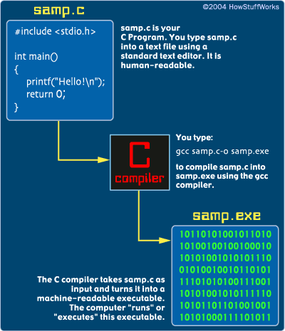The Simplest C Program
Let's start with the simplest possible C program and use it both to understand the basics of C and the C compilation process. Type the following program into a standard text editor (vi or emacs on UNIX, Notepad on Windows or TeachText on a Macintosh). Then save the program to a file named samp.c. If you leave off .c, you will probably get some sort of error when you compile it, so make sure you remember the .c. Also, make sure that your editor does not automatically append some extra characters (such as .txt) to the name of the file. Here's the first program:
#include <stdio.h>
int main()
{
printf("This is output from my first program!\n");
return 0;
}

When executed, this program instructs the computer to print out the line "This is output from my first program!" -- then the program quits. You can't get much simpler than that!
Advertisement
To compile this code, take the following steps:
- On a UNIX machine, type gcc samp.c -o samp (if gcc does not work, try cc). This line invokes the C compiler called gcc, asks it to compile samp.c and asks it to place the executable file it creates under the name samp. To run the program, type samp (or, on some UNIX machines, ./samp).
- On a DOS or Windows machine using DJGPP, at an MS-DOS prompt type gcc samp.c -o samp.exe. This line invokes the C compiler called gcc, asks it to compile samp.c and asks it to place the executable file it creates under the name samp.exe. To run the program, type samp.
- If you are working with some other compiler or development system, read and follow the directions for the compiler you are using to compile and execute the program.
You should see the output "This is output from my first program!" when you run the program. Here is what happened when you compiled the program:
If you mistype the program, it either will not compile or it will not run. If the program does not compile or does not run correctly, edit it again and see where you went wrong in your typing. Fix the error and try again.